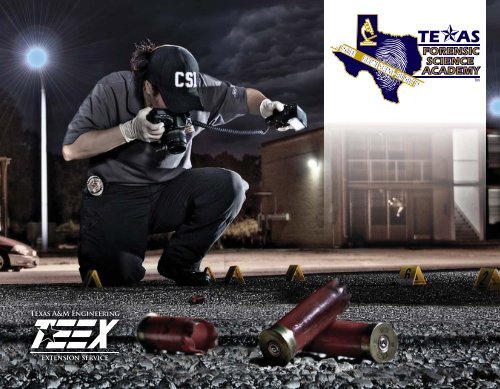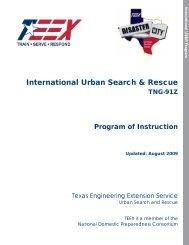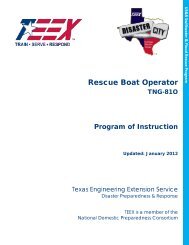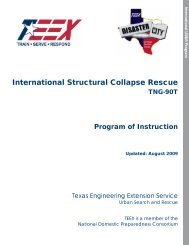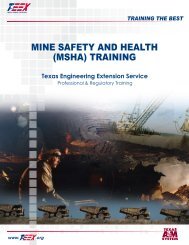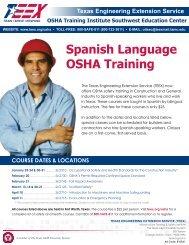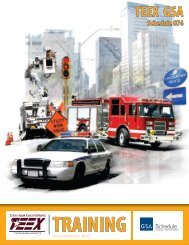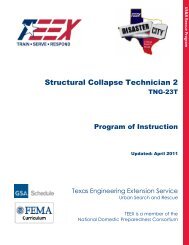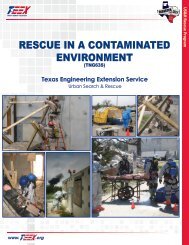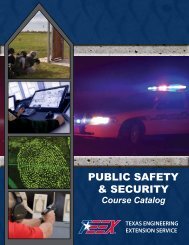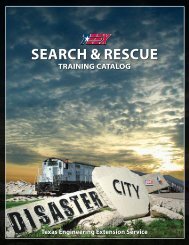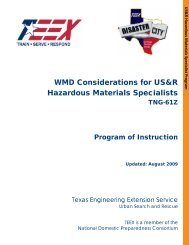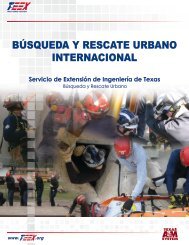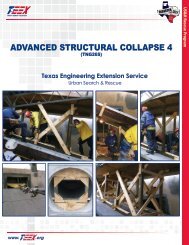Forensic Science Academy - Texas Engineering Extension Service ...
Forensic Science Academy - Texas Engineering Extension Service ...
Forensic Science Academy - Texas Engineering Extension Service ...
Create successful ePaper yourself
Turn your PDF publications into a flip-book with our unique Google optimized e-Paper software.
TEASFORENSICSCIENCEACADEMYTM
"BETTER SCIENCE LEADS TO BETTER JUSTICE FOR ALL"
“I strongly feel the courses offered through the <strong>Texas</strong> <strong>Forensic</strong> <strong>Science</strong> <strong>Academy</strong> certificate program are atrue benefit to both law enforcement agencies and the State of <strong>Texas</strong>.”- Sheriff Joel W. Richardson, Randall County, TX
WHY THE FORENSIC SCIENCE ACADEMY...JOB EFFECTIVENESSThe <strong>Texas</strong> <strong>Forensic</strong> <strong>Science</strong> <strong>Academy</strong> emphasizes active learning through hands-on training. You will be taught by experienced practitioners andspecialists. You will gain valuable experience by applying many of the collection processes and procedures in simulated crime scene environments orlaboratories. This experiential learning leads to increased competence and confidence. The <strong>Texas</strong> <strong>Forensic</strong> <strong>Science</strong> <strong>Academy</strong> can make you a morevaluable asset to your agency.PROFESSIONAL CREDIBILITYCredentialing, coupled with experience, is important for your professional credibility. Whether it is proving your value as an expert witness on the stand,getting a choice assignment or promotion, or moving into a desired job specialization, attainment of the <strong>Texas</strong> <strong>Forensic</strong> <strong>Science</strong> <strong>Academy</strong> certificates canmake a difference in your career.ACCREDITATION AND COLLEGE CREDITAll of the courses taught through the <strong>Texas</strong> <strong>Forensic</strong> <strong>Science</strong> <strong>Academy</strong> are accredited as continuing education through the <strong>Texas</strong> Commission on LawEnforcement Officer Standards and Education (TCLEOSE) and similar credit may be available through the peace officer standards and training agenciesof other states. Many of the courses taught through the <strong>Academy</strong> are also accredited for continuing education through the International Associationfor Identification (IAI). Completion of the <strong>Forensic</strong> Technician, <strong>Forensic</strong> Investigator I and <strong>Forensic</strong> Investigator II certificates may also apply as collegesemester credit for people seeking a Bachelor of Applied Arts and <strong>Science</strong>s (BAAS) degree in Criminal Justice through an innovative program withTarleton State University, a member of the <strong>Texas</strong> A&M University System.5
“Today, well-trained forensic personnel are becoming a major component needed to increase theprofessionalism within the criminal justice system. More importantly, these personnel have a responsibilityto ensure public confidence in the criminal justice system.”Dr. James J. Vardalis, Director, Criminal Justice Studies, Tarleton State University6
CERTIFICATE PROGRAMSThe <strong>Texas</strong> <strong>Forensic</strong> <strong>Science</strong> <strong>Academy</strong> has several programs of study that lead to recognized technical certificates including; <strong>Forensic</strong> Technician, <strong>Forensic</strong>Investigator (Level I & Level II), Major Crimes Investigator and Property and Evidence Management. These certificates are designed to give graduatesa recognized credential that can translate into greater recognition within the criminal justice community. <strong>Texas</strong> <strong>Forensic</strong> <strong>Science</strong> <strong>Academy</strong> courses areaccredited by IAI and TCLEOSE.FORENSIC TECHNICIANCERTIFICATEFORENSIC INVESTIGATOR 1CERTIFICATEFORENSIC INVESTIGATOR 2CERTIFICATEREQUIRED COURSES:REQUIRED COURSES:REQUIRED COURSES:ELECTIVE COURSES (CHOOSE ONE):<strong>Forensic</strong> EntomologyPROPERTY & EVIDENCEMANAGEMENT CERTIFICATEREQUIRED COURSES:MAJOR CRIMESINVESTIGATOR CERTIFICATEREQUIRED COURSES:ELECTIVE COURSES (CHOOSE ONE):Blood Stain Pattern Analysis<strong>Forensic</strong> Photography IICollision Reconstruction<strong>Forensic</strong> EntomologyFire Investigator7
“By providing training in these fields, law enforcement’s abilities to recognize integral pieces of evidenceand properly collect it and preserve it will be enhanced. Subsequently, the interpretation of these scenes maylead to increased incarcerations of those responsible for these crimes.”-Jeff Tomberlin, Assistant Professor, <strong>Forensic</strong> and Investigative <strong>Science</strong>s - Entomology, <strong>Texas</strong> A&M University8
COURSESFORENSIC TECHNICIAN - FSA10080 HOURSThis course provides participants with information, techniques and methodologies for conducting crime scene investigations and processing crime sceneevidence. Photography is an integral part of this course. This course is equivalent to completing Crime Scene Investigation and Latent Print Processing.TOPICS Crime scene searches and legality Crime scene documentation Evidence collection, packaging and preservation Electronic evidenceCRIME SCENE INVESTIGATION - FSA10640 HOURS Powder processing of fingerprints Fingerprint processing with chemicals and dyes Processing blood prints Processing fingerprints on difficult surfacesThis course provides participants with information, techniques and methodologies for conducting investigations ranging from general crime sceneinvestigations to death investigations. Course instruction is through lecture and case review with emphasis on practical application.TOPICSCrime scene searches and legalityPreparation for crime scene investigationsCrime scene documentationCollection, packaging and preservation of evidenceLATENT PRINT PROCESSING - FSA10440 HOURSFingerprints and fingerprint processingElectronic evidenceThis course provides participants with information, techniques and methodologies for processing latent fingerprints and enhancing visible fingerprintsfound at crime scenes and on physical evidence.TOPICSPhysiology of latent printsPowder processingLatent print processing with chemicals, dye andnon-powder processesProcessing blood printsProcessing fingerprints on difficult surfaces9
COURTROOM TESTIMONY - FSA11140 HOURSThis course provides participants with an understanding of the basic factors that create effective courtroom testimony. Participants will learn about beingidentified as an expert witness and having evidence admitted at trial.TOPICSUniversal Communication SkillsBASIC CRIMINAL INVESTIGATION - FSA105 — ALSO AVAILABLE ONLINE40 HOURSReport PreparationTestifying in Courtappropriate for agencies that require officers to perform both patrol and investigative functions. Participants will learn to manage a wide variety ofcommon criminal investigations, from a response to the initial scene to case preparation and presentation for prosecution. Emphasis is placed onmanaging the legal processes involved in investigations, including preparation of affidavits, procurement and execution of search and arrest warrants,interview and interrogation procedures and rules governing the collection and preservation of evidence.TOPICSBasic principles of criminal investigationInterview and interrogation techniquesUtilizing informantsCrime scene investigationLATENT PRINT PROCESSING - FSA10440 HOURSSubpoenas, warrants and search warrantsCase preparationProperty crime investigationsCrimes against persons investigationsOther types of special topic investigationsThis course addresses the basic concepts of photography and their application to thorough, professional crime scene documentation. <strong>Forensic</strong>Photography I or a course equivalent is required for attendance to <strong>Forensic</strong> Photography II.TOPICSCamera and film selectionCamera operationEvaluating lightUtilizing depth of fieldCommon photographic errorsCrime scene photographyPhotographic equipmentStandards for digital evidence10
PROCESSING EVIDENCE OF VIOLENT CRIMES - FSA10840 HOURSThis course provides participants with information, techniques and methodologies for processing and documenting violent crime scenes such as assaults,sexual crimes and homicides, as well as physical evidence found at crime scenes.TOPICSCrime scenes and biological evidenceProcessing items for biological evidenceCollection and packaging of biological evidenceCollection of trace evidenceSKELETAL DEATH PROCESSING - FSA10940 HOURSCollection of impression evidenceProcessing firearms and ammunition for physical evidenceCrime scene documentationThis course is designed for those responsible for death investigations, including cold case death investigations dealing with skeletal remains. In thiscourse, which introduces the field of forensic anthropology, participants will receive instruction in the recovery and analysis of human remains inforensic contexts.TOPICSHuman osteologyBLOODSTAIN PATTERN ANALYSIS - FSA10340 HOURSAssessment of traumaEstimating the postmortem intervalField recovery techniques for buried and scattered skeletal remainsThis course is designed for those who investigate crime scenes containing blood evidence, such as assaults and death investigations, as well as thosewho process bloodstained evidentiary items. The course provides participants with basic knowledge of bloodstain pattern analysis, including methodsand skills for the interpretation of bloodstain evidence at crime scenes and on evidentiary items. Participants will learn to make determinations such asthe relative positions of the victim or suspect, the nature of the force and object used, and the approximate number of blows struck.TOPICSHistory of bloodstain pattern analysisUtilizing bloodstain pattern analysis at crime scenesMeasuring bloodstainsIdentification and analysis of bloodstain patternsBiological hazards in crime scenesChemical processing of crime scenesBloodstain pattern analysis and courtroom testimony11
DEATH INVESTIGATION - FSA11040 HOURSThis course addresses the procedures for conducting investigations of various types of death and includes the investigator's role from the initial sceneinvestigation to courtroom presentation.TOPICSMedical Examiner and Coroner SystemsTypes of TraumaSuicideFORENSIC PHOTOGRAPHY II - FSA11240 HOURSAutopsy and Laboratory CapabilitiesTestifying in CourtEthical ConcernsCoping with StressThis course addresses advanced aspects of forensic photography, including macro, nighttime and alternate light photography. <strong>Forensic</strong> Photography I ora course equivalent is required for attendance to <strong>Forensic</strong> Photography II.TOPICSEquipment and basic exposure reviewMacro photographyReciprocity failureFlash photographyPainting with lightShooting reconstructionsBloodstain photographyUltraviolet and infrared photographyPhotographic perspectiveTFSA <strong>Forensic</strong> Technician, <strong>Forensic</strong> Investigator Level I and II courses have beenreviewed and approved by the International Association for Identification (IAI) ascontinuing education for Crime Scene Certification12
ADDITIONAL TRAININGFORENSIC ENTOMOLOGY - FSA10240 HOURSThis course addresses the collection, preservation and understanding of entomological evidence resulting from the insect colonization of victims.Participants will learn to apply principles of forensic entomology to questions concerning victim transport, toxicology and approximate time of death.Course instruction is through lecture, laboratory exercises and field application.TOPICSLaw enforcement application of forensic entomologyCollecting and preserving entomological evidenceInsects of forensic importanceEnvironments in which bodies decomposeEnvironmental factors affecting decomposition by insectsBASIC PROPERTY TECHNICIAN - LET250 — ONLINE16 HOURSCollecting specimens from human remainsPreserving collected specimensRearing specimens collected from human remainsChain of custody and shipping issuesThis web-based course provides participants with information, techniques and procedures for managing property and evidence collected and stored forlaw enforcement purposes. The course includes interactive scenarios based on the application of <strong>Texas</strong> law and proven practices developed by the <strong>Texas</strong>Association of Property and Evidence Inventory Technicians (TAPEIT).The TEEX Basic Property Technician course is recognized by TAPEIT as meeting a portion of the requirements necessary to achieve the TAPEIT PropertyTechnician Basic Certification.TOPICSChain of custodyPackaging and documentation requirementsProperty room management13
APPLY YOUR TFSA TRAINING CERTIFICATES TOWARD YOUR DEGREETHE FOLLOWING SCHOOLS HAVE APPROVED TEXAS FORENSICS SCIENCE ACADEMY COURSES FOR COLLEGE CREDIT TOWARD AN ACCREDITED DEGREE.Tarleton State University offers the BAAS in Criminal Justice Administration program. The BAAS program is designed for employeesof the criminal justice system seeking career advancement and academic credentials. You can complete the degree requirementsonline or at Tarleton campuses located in Stephenville, Ft. Worth and Waco, <strong>Texas</strong>. www.tarleton.eduBethel University College of Public <strong>Service</strong> offers Bachelor of <strong>Science</strong> degrees in Criminal Justice or Emergency <strong>Service</strong>sManagement. These degree programs are delivered online to fit the lifestyles of working professionals ready to increase theirpotential. Whether students are interested in law enforcement, emergency management, homeland security or any other area ofpublic safety, the College of Public <strong>Service</strong> has the tools students need to be successful. www.bethelu.eduTEXAS FORENSIC SCIENCE ACADEMY AND OTHER HIGHER EDUCATION PARTNERSTHE TEXAS FORENSIC SCIENCE ACADEMY WOULD LIKE TO RECOGNIZE THE FOLLOWING INSTITUTIONS AS BEING INSTRUMENTAL IN THE RESEARCH, DESIGNAND DELIVERY OF THE FORENSIC SCIENCE TRAINING PROGRAM.The <strong>Forensic</strong> and Investigative <strong>Science</strong>s degree program of <strong>Texas</strong> A&M University (TAMU) prepares students for careers that involvethe collection, preservation, processing and use of evidentiary information to solve problems. The collaboration between TAMUfaculty and TEEX Subject Matter Experts has resulted in the creation of curriculum that reflects cutting edge technologies andThe <strong>Forensic</strong> Anthropology Center at <strong>Texas</strong> State (FACTS) is a multifaceted forensic anthropological research, teaching andanthropology and body recovery for law enforcement personnel. www.txstate.edu14
All forensic scientists have an ongoing obligation to remain current in their field through continuingeducation and other developmental activities...-National Institute of Justice Journal
"BETTER SCIENCE LEADS TO BETTER JUSTICE FOR ALL"TRAINING FACILITIESRIVERSIDE CAMPUSFACILITIES & INFRASTRUCTUREThe <strong>Texas</strong> A&M Riverside Campus is a 1,900-acre campus adjacent toState Highway 47 and Highway 21 west of Bryan, <strong>Texas</strong>. The <strong>Texas</strong> A&M<strong>Engineering</strong> <strong>Extension</strong> <strong>Service</strong> occupies about 100,000 square feet ofoffices, classrooms and laboratories. The agency also maintains outdoortraining facilities at Riverside, including overhead and underground electricpowertraining fields, a firing range and a live-fire shoot house for lawenforcement officers, a heavy-equipment training field, an emergencyvehicledriving track, unexploded ordnance ranges and search grids andsimulation prop houses for tactical training.Firearms RangeSimulation Prop HousesLive-fire Shoot HouseTEXAS A&M ENGINEERING EXTENSION SERVICE<strong>Texas</strong> Law Enforcement <strong>Extension</strong> Program200 Technology Way, College Station, TX 77845-3424C13.6681.021.800.423.8433 | publicsafety@teexmail.tamu.edu


